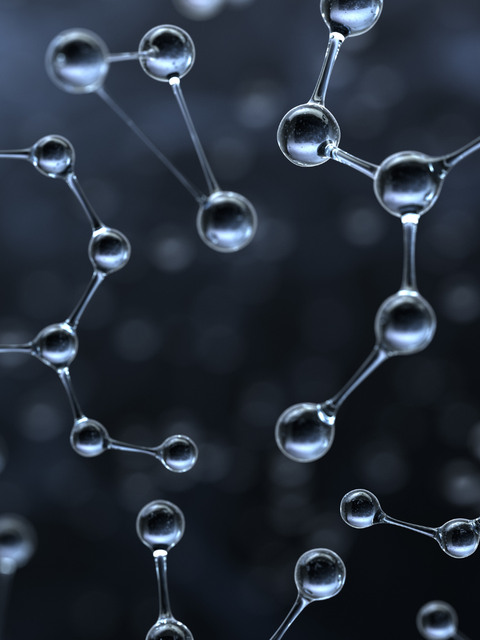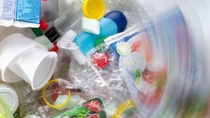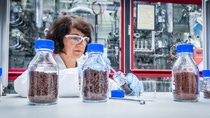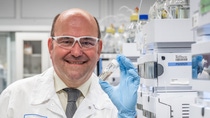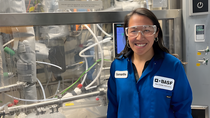Who we are
Bernhard Ulrich von Vacano
Normally, it is the greatest joy of every chemist to produce an unprecedented molecule. With Bernhard von Vacano it is exactly the opposite. He does everything he can to recover the original molecules from plastic waste and reassemble them into new products. In doing so, the expert in plastics recycling contributes to a visionary world without waste, in which garbage is optimally used as raw material and energy. Bernhard is advancing holistic solutions for a plastics circular economy in BASF research.
You are an expert on the major topic of plastics recycling at BASF. Do you also exercise great importance to recycling at home?
Absolutely. And not just on recycling. In the circular economy, as in my case, this is preceded by repairs and reuse. I love to improvise and very often find a way to fix broken things. However, it is difficult to recycle perfectly at home because there are so many factors involved: Wash the yogurt cup or not? Wipe it out? In any case, it’s neatly spooned out into the plastic bin. The responsibility does not rest solely with the consumer – especially since plastics are also marketed in countries where there is no collection infrastructure at all. Plastics recycling is a system issue that we at BASF are also tackling as a manufacturer of plastics, most of which are used for technical applications outside of packaging.
How is BASF tackling the circular economy? And what is your role in this?
BASF products should not only make a positive contribution and save energy or emissions during their life cycle, for example as insulation material, lightweight components in electric cars or epoxy resin in wind turbines. They should also have value at the end of their life as raw materials for new products, instead of ending up in a landfill or incinerated. In research, we work on many levels on the topic of plastics recycling and circular economy. For us to move forward, the various building blocks must all fit together. I orchestrate our research topics and make sure we do research on the topics that best advance us. My specialty is closed-loop polymer recycling – which means we try to turn plastic waste back into its original product.
How do you manage to make products from plastic waste that are indistinguishable from new products made from fresh petroleum?
n one method, we reverse the production of the product and dissolve the chemical bonds of the polymers. In this way, we recover their components, the monomers, and can process them. From this, we turn it back into a polymer that has the same quality as one newly produced from fossil raw materials. For me, the most beautiful thing is when we succeed in recovering molecules from waste that are as good as new. The Monomers (CM) business unit, for example, is working to produce new mattresses from some of the approximately 40 million disposed every year in Europe and would otherwise probably be incinerated. The recycled mattresses cannot be distinguished from new ones – apart from their better CO2 balance, among other things due to the avoided combustion. We are currently researching how we can also use this so-called depolymerization in other BASF polymers.
Recycled glass fibers from a composite material can be reused in new polymeric materials.
The term plastic waste refers to products as diverse as sneakers, water bottles, or old components from cars. Is there a separate recycling method for each type of waste?
We need different approaches, which we combine optimally to keep more plastics in the cycle and to use as few resources and energy as possible during recycling.
To recycle properly sorted, cleaned beverage bottles, it is sufficient to melt them down and process them into new bottles. Unfortunately, with a sneaker or plastic parts a car, the story is different. In most cases, a sneaker consists of different types of plastic glued together, which are difficult to separate and thus recycle. In the future, we should design products in such a way that simple and clean separation is possible or even no longer necessary. To demonstrate the possibility, BASF has teamed up with Adidas to create a shoe made from a single material and can therefore be recycled very well. We need such approaches, of "design for recycling", much more.
What about the garbage that just can't be separated? Is incineration the solution?
No, not really. There will be waste for which only energy recovery can be considered: after all, the carbon bound in the product will be used to generate energy. But we have to move away from this to a large extent if we want to enable a world with net zero emissions, i.e., without further CO2 emissions. We will then have to capture CO2 from combustion at great expense. So, the goal is to reduce the amount of waste that goes into incineration. For example, some mixed plastic waste, which is otherwise not suitable for recycling in a "small circle", can be converted into an oil that is used instead of crude oil for new products using a special process with a little more energy. This type of chemical recycling is called pyrolysis and is being practiced at BASF in the ChemCycling project. Using a certified mass balance, the use of such recycled raw materials can then be attributed to individual products – right up to outdoor pants from Vaude! This is much better than combustion, because it allows us to keep the carbon atoms in circulation and replace the use of fossil crude oil during production in the long term.
In the perception of many people, plastic is synonymous with environmental destruction. Everyone is familiar with pictures of littered oceans. What do you say to that?
Carelessly discarded garbage, while hiking in the forest or on the beach, makes me angry. Plastics are victims of their own success. They are produced in large quantities and used carelessly, especially in short-lived products like packaging, that they are unfortunately now everywhere. I am also asked why I like working with polymers, i.e., plastics, even though they pose a serious problem to our environment in the form of plastic waste. But plastics have many advantages during their lifetime and, if used correctly, enable an energy transition and climate protection. They are lightweight, durable and save energy in production and application, for example as refrigerator insulation. That is why it's so important we develop research solutions for durable products and better recycling of plastics: so they fit into a cycle and have a value as a new raw material instead of being burned or even ending up in the environment.
Everyone sees the problem, but no one alone can solve it. What hurdles do you see for the circular economy?
We can scientifically clarify, research and calculate the technical issues. But whether we can implement a solution depends on many factors: What waste is collected and how, can individual plastic components be removed from products, how high are taxes and levies on incineration and landfilling, what is politically recognized as recycling? So far, the ideas of the circular economy are still developing at different speeds in the different regions of the world. It is a challenge to coordinate all steps and implement the right solutions – but we are working on it together with many different partners.
What do you enjoy most about your job?
For me, it's the contact with people and the enormously important topic I'm working on. Since we as BASF are a supplier to many industries, we have a unique opportunity to make a real difference through our inventions and new technologies in the field of recycling – for BASF but also worldwide for a sensible use of our planet.
If, for example, we see from research that a possible valuable piece of the puzzle is missing in the overall picture of technologies, I initiate new projects with experts from research or the business sector, and also with industrial partners, universities, or within the framework of publicly funded projects of the European Union. It is incredibly exciting to work with so many different partners on a common goal and to learn from each other. This accommodates my insatiable curiosity.
Why did you want to become a researcher?
Funny enough, at school I was initially of the opinion that science might not be for me. But the fewer numbers and the more "letters" appeared in math and physics, the more fun it became for me. I'm fascinated by things you can't see but can describe scientifically – I wanted to understand how everything around me works. So, I decided to study chemistry and at the same time I always felt very attracted to physics, so I let off steam there in my studies and doctoral thesis. At BASF, I felt very comfortable in research right from the start, because here I can combine knowledge from different areas and thus develop new ideas that find real application in our everyday lives.
Many people are resigned and think the fight against climate change is lost. What motivates you to keep going?
In recent years, it has become increasingly clear to me that with solutions from chemistry, we have a key in our hands to solving the world's major problems. Whether it's climate change or the circular economy, it has everything to do with how we deal with materials and energy and convert them to avoid waste of resources and generate waste. From a purely technical point of view, it would be feasible with our current technologies to cover all our energy needs in the world with renewable energy.
We would need to agree socially on how to pay for it and how to organize it. We must manage to decouple our standard of living from over consumption. It's not easy, but it's totally doable. This makes me optimistic and drives me to look for better and better solutions myself and to inspire others to walk a similar path.
Join the team.
- Become a smart scientist yourself? The world needs innovation. We need you.Explore open positions.
